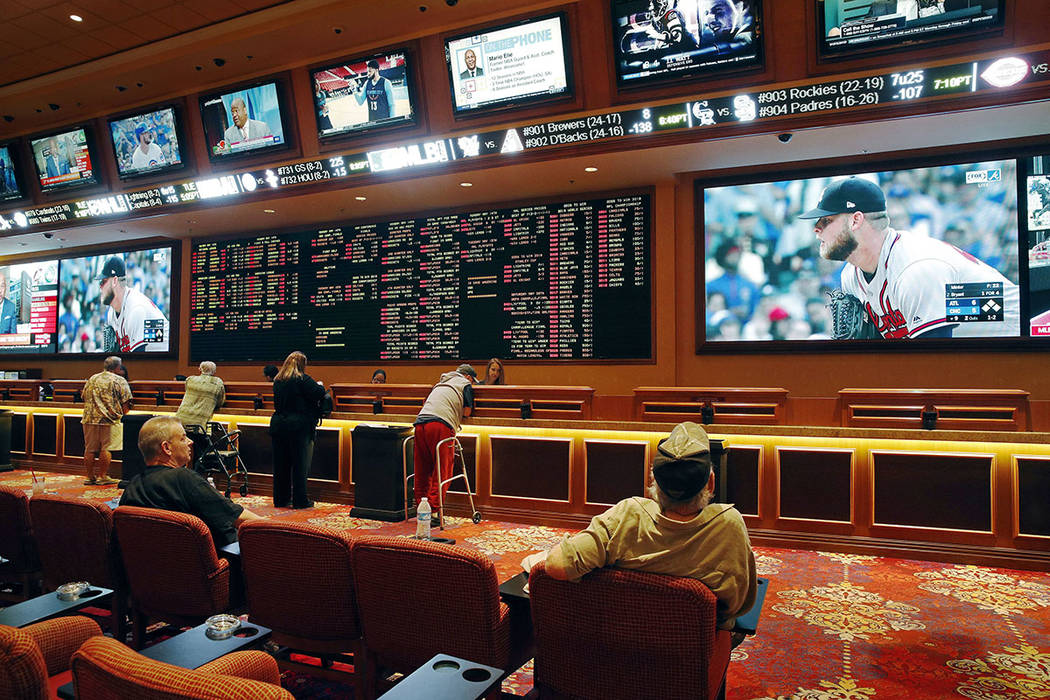Schumer-Hatch bill would regulate sports betting nationwide

Nevada lawmakers and sports betting executives are booing a new bill that would give the federal government the power to regulate sports wagering.
It’s the federal government’s first attempt into regulating sports betting, which could generate $8 billion in casino win by 2030, according to estimates by U.K.-based market research firm H2 Gambling Capital.
“If this bill passes, we get to a world where the government plays a far more significant role in the world of gambling than it does today,” said Chris Grove, a managing director at Eilers & Krejcik.
U.S. Sens. Chuck Schumer and Orrin Hatch submitted the Sports Wagering Market Integrity Act of 2018 Wednesday that would grant Congress the right to restrict certain sports wagers, create an entity that would monitor illegal activity and require sportsbook operators to pay for league data, such as game scores and player performance statistics.
The bipartisan bill was drafted following May’s U.S. Supreme Court decision that overturned a law banning wagering in most states. Seven states have joined Nevada since in permitting sports wagering. Dozens more are expected to vote on it within two years.
Schumer, D-N.Y., said the bill is necessary to protect consumers — as well as the games themselves — from corruption and would establish new enforcement tools. Nevada executives and legislators said states have been doing fine on their own for decades without federal oversight.
“This bill undermines Nevada’s expertise and experience in establishing a successful, regulated sports betting market,” said Rep. Dina Titus, D-Nev. “As I have said before, we should be cautious not to reinvent the wheel or derail what’s working, and I fear this legislation is a step in that direction.’’
The American Gaming Association, the industry’s Washington D.C.-based lobbyists, agreed with Titus, calling the bill “a solution in search of a problem.” MGM Resorts International, Boyd Gaming Corp. and Station Casinos declined to comment. Wynn Resorts, Caesars Entertainment Corp. and Las Vegas Sands did not respond to a request for comment. All are members of the lobby group. Representatives of the state Gaming Control Board, which enforces gaming regulations in Nevada, also had no comment on the proposal.
Several leagues and casino companies have already signed agreements among themselves on the use of league sports data. MGM has signed sports betting deals with the NBA, NHL and MLB as well as a few professional teams since the U.S. Supreme Court decision in May. William Hill US and Caesars have also signed deals with professional teams.
The legislation is supported by professional leagues, including the National Football League and National Hockey League, which say the proposed legislation would protect game integrity. The leagues would receive payments for data should it pass.
“The threats posed to the integrity of sporting contests cannot be confined within state borders,” NFL Executive Vice President Jocelyn Moore said in a letter to the senators who introduced the bill, “The arrival of the internet has significantly compounded these threats.”
Joe Asher, the CEO of William Hill US, the largest operator of U.S. sports books by number of locations, said the bill gives the leagues greater bargaining power with operators over data.
“This is all about the wealthy private parties trying to gain further commercial advantage through the legislative process,’’ Asher said, referencing the leagues. “It sets up monopoly pricing power.’’
Sara Slane, senior vice president of public affairs for the American Gaming Association, said the mandatory use of official league data and the creation of a national sports clearinghouse should be decided in the marketplace and negotiated between leagues, teams and private companies and not legislated.
“In the mere six months since the U.S. Supreme Court paved the way for legal, regulated sports betting, significant developments on both of these fronts have already occurred without any federal involvement,” she said.
Titus and Asher said the legislation would prompt customers to stick with the illegal sports betting market, which handles about $150 billion in wagers annually, according to the association.
The bill, though, does offer some benefits for operators. It would allow permit states to offer online betting as well as interstate wagering.
However, those benefits are not enough to override the drawbacks for operators and states of having the federal government dictate the rules, said Grove.
The states could potentially surrender some of the taxes from sports betting to the federal government for monitoring and enforcement, he said.
Grove said he doesn’t think the bill would garner enough support to pass.
The Review-Journal is owned by the family of Las Vegas Sands Corp. Chairman and CEO Sheldon Adelson.
Contact Todd Prince at 702-383-0386 or tprince@reviewjournal.com. Follow @toddprincetv on Twitter. Review-Journal staff writers Richard N. Velotta, David Schoen and Michael Gehlken contributed to this story.













